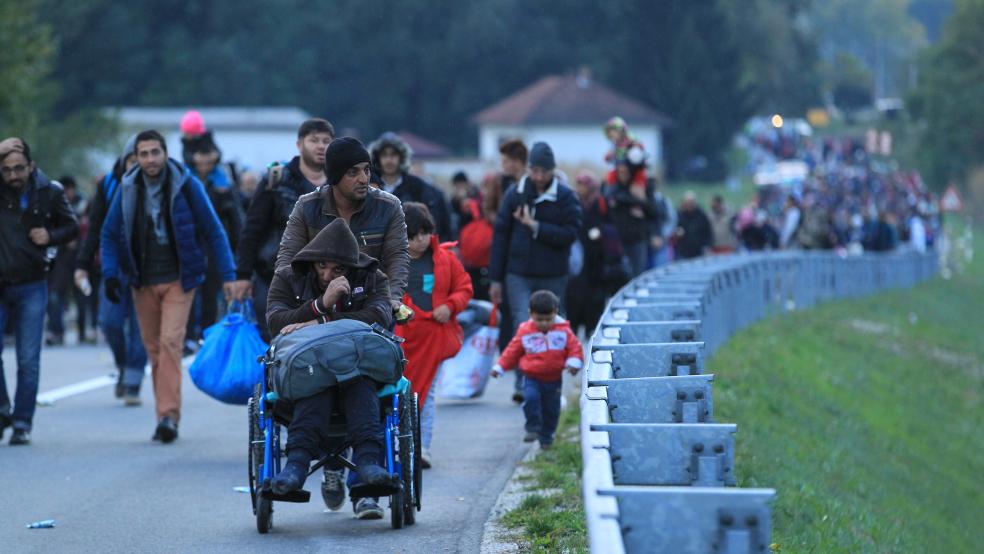ROSZKE, Hungary (Reuters) - Viktor Orban's fence may have earned the wrath of rights groups but it's going down well at a flower market near the Hungarian border town of Roszke, where the flow of migrants through fields of corn and sunflowers has suddenly dried up.
The right-wing prime minister's critics say the fence on the frontier with Serbia flies in the face of international law. But to many on Hungary's southern frontier, the end justifies the means."Thank God that Viktor Orban is our prime minister," said a 46-year-old man who gave his name as Istvan and was selling flowers on Thursday at the Roszke market. "He doesn’t have to be loved, but what he does is good."Echoing Orban in framing the issue as a defense of Europe’s “Christian states” against mainly Muslim migrants from the Middle East, Africa and Asia, Istvan said: “So far it seems that Hungary is the most Christian of all.”Two days after Hungary sealed the frontier to thousands of migrants crossing the Balkan peninsula daily, the flow had dried to a trickle. Several hundred were arrested for breaching the fence on Wednesday, and face imprisonment or expulsion.Hundreds of stone-throwing men clashed with Hungarian riot police over the fence on Wednesday, demanding passage. But by Thursday their makeshift camps were emptying out, as migrants, many of them refugees from the Syrian war, sought out other routes to western Europe through Croatia.Under Orban’s new rules, many of those who formally seek asylum in Hungary face rejection within hours. He has warned that Muslims risk outnumbering Christians in Europe, and launched an anti-immigration campaign earlier this year with billboards around the country saying migrants must respect Hungarian culture and keep their hands off local jobs.The United Nations human rights chief on Thursday “deplored the xenophobic and anti-Muslim views that appear to lie at the heart of current Hungarian government policy.”But the policy chimes with many in Hungary, who say they are paying the price of an overly-tolerant West and a negligent Greece that failed to enforce EU rules by registering and holding migrants and asylum seekers arriving from Turkey. ORBAN: 8 OUT OF 10An opinion poll by the Szazadveg think tank, which is close to Orban's government, suggested his approval rating was higher in September, mainly among those of the political center or right, at 48 points, from 43 in June and 40 in December. The figures do not tell the whole story as many Hungarian activists rallied to the migrant cause before the crackdown, bringing food, water and clothing to families sleeping at railway stations and walking along highways.The fence is a "tragedy" said Judit, a 67-year-old grandmother of five, wearing a flower-patterned apron."I don't agree with the way the government is handling this problem, because I have seen the refugees from close up, every day, and it was heart wrenching to see the many children and the families torn apart," she said.Others lamented only that the crackdown had not come sooner."I think that if these steps had been taken when the first 40 to 50 were coming every day, we would not have faced this huge problem which is now hitting the whole of Europe,” said Gyorgy, a grey-haired man leaning on a flower box.Mihaly, 58, said he felt sorry for the young children who have made often perilous journeys by sea and land from conflict or poverty. But the government was right to act, he said, though he criticized the expense of the fence."Had they set up proper border patrols with this money ... for a year and a half they could have paid people to defend the border, with arms, as before," he said.The market vendors had seen many migrants pass by in the preceding months, often through fields and forests. Some helped with food and clothes, said Gyozo, surrounded by buckets of fresh roses.But the situation, he said, became "unbearable". He gave Orban eight out of 10 for his handling of the crisis. "It is not a 10 perhaps because they should have recognized (the situation) earlier," he said. (Editing by Matt Robinson and Timothy Heritage)On the other side of Hungary's fence: 'Thank God for Orban!'

© Antonio Bronic / Reuters



